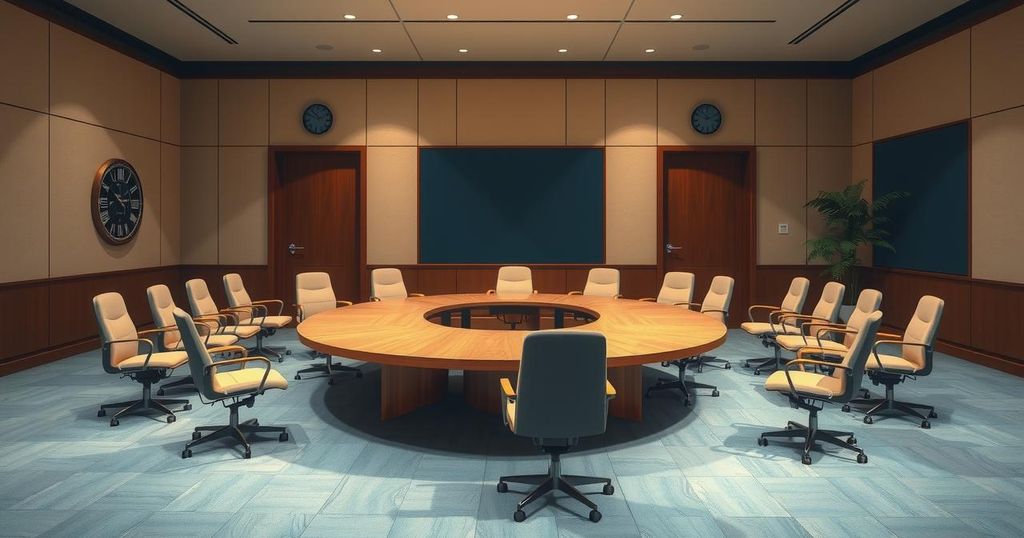Critique of Cabinet Performance: Analysts and Politicians Weigh In
The outgoing Cabinet led by President Nangolo Mbumba has been criticized as underperforming, particularly for its handling of poverty, service delivery, and the liquidation of Air Namibia. Analysts and opposition figures provided low ratings across various essential sectors, indicating significant dissatisfaction with the government’s ability to tackle pressing national issues, including youth unemployment and economic management.
The outgoing Cabinet, led by President Nangolo Mbumba, has received unfavorable assessments from analysts and political figures, who have ranked its performance as subpar. The primary criticisms include escalating poverty, inadequate service delivery, and the liquidation of Air Namibia, indicating significant failures in governance. Analysts evaluated the Cabinet’s efforts in four essential areas: youth unemployment, economic strengthening, infrastructure improvement, and service delivery, reflecting considerable discontent within society.
In his final address to the National Assembly, President Mbumba defended the Cabinet’s actions, asserting that it took definitive steps towards fostering economic growth, employment, and poverty alleviation for all citizens. He emphasized the administration’s commitment to addressing inequalities and enhancing the inclusion of marginalized groups in Namibia’s economy. However, that perspective contrasts sharply with the assertions of opposition members and analysts, who express skepticism regarding the administration’s achievements.
Kalimbo Iipumbu, a member of the Namibia Economic Freedom Fighters, criticized the Cabinet’s performance, particularly highlighting the stigma attached to Air Namibia’s liquidation in 2021, which resulted in the loss of approximately 600 jobs during a precarious economic situation. He described the merger of the ministries of finance and public enterprises as hasty, advocating for a thorough examination of the airline’s challenges to potentially revive it. Iipumbu also mentioned missed opportunities regarding agricultural reforms, like the outdated veterinary cordon fence, and suggested a government leadership mandate extension to better address national needs.
The Landless People’s Movement (LPM) assigned the government a score of 4.25 out of 10, acknowledging the challenges posed by the Covid-19 pandemic. LPM spokesperson Lifalaza Simataa articulated concerns over government neglect of crucial sectors such as agriculture, specifically in the context of drought. Furthermore, he criticized service delivery, citing low pass rates among secondary school pupils as indicative of systemic educational failures, with only 22% of students passing between 2020 and 2022.
Political analyst Rui Tyitende expressed doubt regarding President Mbumba’s claims of progress amidst the socio-economic crises affecting Namibia, highlighting the severe poverty rates and failing education system. He criticized the ruling party, Swapo, for relying on rhetoric rather than delivering tangible economic change. Emphasizing the need for an administration focused on addressing the real-life conditions of citizens, Tyitende urged future leadership to avoid disillusionment with development narratives that do not correspond with the citizens’ lived experiences.
Human rights activist Rosa Namises echoed the sentiment of dissatisfaction with the government’s performance, assessing it at four out of ten. She pointed to the escalating issues of unemployment, poverty, and violence against women, noting the adverse effects on youth, including rising suicide rates and drug addiction. Namises highlighted the need for justice and accountability for violent occurrences within society, expressing concern over the government’s silence perpetuating state-sponsored violence.
Economist Omu Kakujaha-Matundu echoed the sentiment of discontent by assigning a score of four out of ten for the Cabinet’s economic management, particularly noting the persistently high unemployment rates, which approach 40%. He criticized the poor state of infrastructure and service delivery, including healthcare inadequacies and housing shortages. Kakujaha-Matundu highlighted government mismanagement, exemplified by the deteriorating conditions of public resources and the insufficient strategies to tackle youth unemployment, which he rated at a mere two out of ten.
The assessments from analysts and opposition leaders regarding President Nangolo Mbumba’s Cabinet depict a concerning outlook on governance in Namibia. Criticism surrounds the administration’s handling of issues such as poverty, service delivery, and economic management, with particular emphasis on the fallout from Air Namibia’s liquidation. The overall low ratings reflect a widespread sentiment of dissatisfaction with government performance and the urgent need for substantive reforms to address the socio-economic challenges faced by the nation. The voices of political figures and analysts call for a re-evaluation of leadership strategies to ensure better alignment with the needs of the citizens.
Original Source: www.namibian.com.na




Post Comment